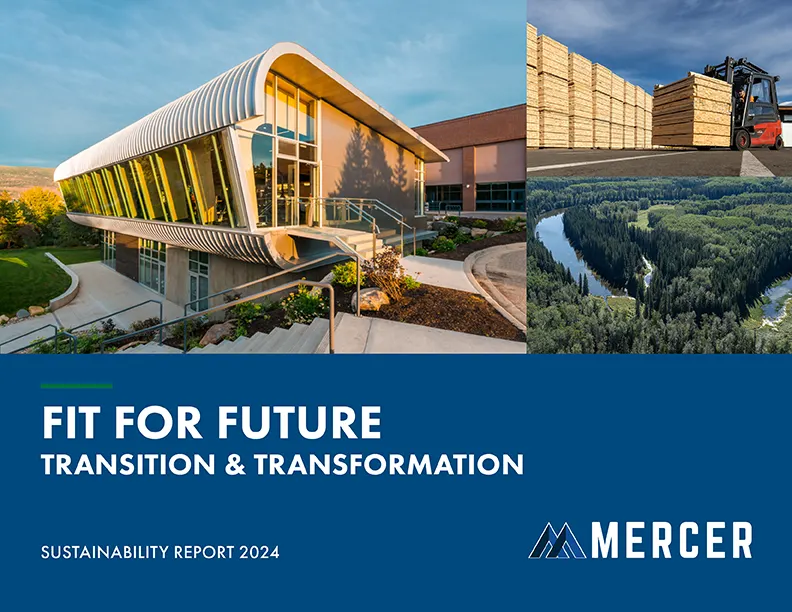Glossary
Bioenergy
Energy derived from the burning and conversion of organic matter, such as wood, agricultural waste, and other biomass, into fuel. It is considered a renewable energy source.
Biofuel
A fuel that is derived from plant biomass by chemical or geological processes.
Biogenic Emissions
Biogenic emissions are greenhouse gas emissions, mainly CO2, released from biological sources like wood fiber and other organic matter. Burning biomass emits carbon that is part of the biogenic carbon cycle. Biomass combustion returns to the atmosphere the carbon that was absorbed as the plants grew.
Biomass
Organic matter (cellulose and lignin) produced by plants.
Biomaterials
A range of materials made from forest biomass and typically used in industrial applications.
Bioproduct
A product derived from biomass and made from biomaterials. Bioproducts offer renewable and sustainable alternatives to traditional products made from fossil fuels and other non-renewable resources. Bioproducts may include bioenergy, biofuels, biochemicals or biomaterials.
Biogenic Carbon
Carbon that is stored in, or derived from, biological sources such as trees and plants.
Carbon Intensity
The relative amount of carbon emitted per unit of some other variable, often per unit of product weight, energy or quantity of fuel consumed.
CDP
Formerly known as the Carbon Disclosure Project. A voluntary framework created by an international nonprofit organization of the same name, the focus of the CDP is on disclosing environmental information to ESG stakeholders.
Circular (Bio)economy
An economic system in which the value of products, materials, and other resources in the economy is maintained for as long as possible, enhancing their efficient use in production and consumption, thereby reducing the environmental impact of their use and minimizing waste and the release of hazardous substances at all stages of their life cycle, including through the application of the waste hierarchy.
Climate-smart Forestry
Forest management that enhances the resilience and adaptive capacity of forests to climate change, while maximizing their carbon storage and sequestration potential.
Climate Transition Plan
A targeted plan that outlines a company’s strategy and specific actions to shift its business model and operations towards a low-carbon and climate-resilient future, contributing to the goals of the Paris Agreement.
Corporate Sustainability Reporting Directive (CSRD)
A landmark European Union legislation mandating public reporting for in-scope companies on their detailed environmental, social, and governance (ESG) impacts and risks. Mercer International is not yet required to comply with CSRD.
Double Materiality
Double materiality is a reporting principle that requires companies to identify both their impacts on people and environment (impact materiality) as well as the sustainability matters that financially impact the undertaking (financial materiality).
European Union Deforestation Regulation (EUDR)
An EU regulation aimed at reducing global deforestation and forest degradation, particularly related to agricultural activities and products imported into the European Union. The EUDR requires businesses to demonstrate that the products they are selling within the EU are free from deforestation and forest degradation.
European Sustainability Reporting Standards (ESRS)
Mandatory disclosure standards for companies within the scope of the Corporate Sustainability Reporting Directive (CSRD) in the EU.
European Financial Reporting Advisory Group (EFRAG)
An association founded in 2001 with the endorsement of the European Commission and the aim of “serving the public interest in financial and sustainability reporting”. EFRAG was tasked with developing reporting standards in line with the CSRD.
Financial Materiality
Under the framework of the Corporate Sustainability Reporting Directive (CSRD), financial materiality focuses on how sustainability matters (environmental, social, and governance factors) create financial risks or opportunities that could reasonably affect a company’s financial performance.
Greenhouse Gas (GHG)
A gas that contributes to the greenhouse effect by absorbing infrared radiation.
Global Reporting Initiative (GRI)
The Global Reporting Initiative Standards. GRI is an international, independent standards organization that helps businesses, governments, and other organizations understand and communicate their impacts on environmental, social, and governance (ESG) matters.
Impact Materiality
Under the framework of the Corporate Sustainability Reporting Directive (CSRD), impact materiality focuses on the actual or potential effects of a company’s operations on the environment and society.
Lieferkettensorgfaltspflichtengesetz – LkSG/German Supply Chain Due Diligence Act – SCDDA
A German law that came into effect on January 1, 2023. It mandates that companies take appropriate steps to prevent human rights and environmental abuses in their supply chains.
Low-carbon
Refers to processes, products, and activities that result in a minimal release of greenhouse gas emissions, particularly carbon dioxide, into the atmosphere. The term generally refers to materials with lower GHG emissions, as compared to similar materials. Low-carbon initiatives are crucial in mitigating climate change by reducing the reliance on fossil fuels and transitioning to more sustainable alternatives.
Network for Greening the Financial System (NGFS)
A group of central banks and supervisors working to understand and manage the financial risks associated with climate change. NGFS has published a set of climate scenarios that are used by companies in conducting climate scenario analysis. The NGFS scenarios were developed to provide a common starting point for analyzing climate risks to the economy and financial system. They represent a global, harmonized set of transition pathways, physical climate impacts, and economic indicators.
Paris Agreement
A legally binding international treaty on climate change adopted in 2015. Its central goal is to limit global warming to well below 2, preferably to 1.5 degrees Celsius, compared to pre-industrial levels.
Science Based Targets Initiative (SBTi)
A globally recognized framework that empowers companies and financial institutions to set ambitious greenhouse gas emissions reduction targets aligned with the latest climate science and the goals of the Paris Agreement.
Sustainability Accounting Standards Board (SASB)
A non-profit which was founded to develop the sustainability accounting standards.
Scope 1 Emissions
Direct GHG emissions resulting from sources that we control, including fossil fuel (e.g. natural gas, diesel, propane, gas) energy consumption from stationary and mobile sources.
Scope 2 Emissions Indirect GHG emissions associated with the purchase of electricity.
Scope 3 Emissions
Indirect GHG emissions from operations in the value chain, covering both upstream and downstream.
Responsibly Sourced (Fiber)
Wood fiber that is either certified or controlled wood, meaning it does not come from illegally harvested or traded wood, from wood harvested in violation of tradition and human rights, from forests where high conservation and ecological values are threatened by management activities, from wood harvested in forests being converted plantations or non-forest use, or from forests in which genetically modified trees are planted.
Sustainable Forest Management
Forest management that ensures the long-term health, resilience, and productivity of forest ecosystems, providing a continuous supply of timber and other forest products while balancing environmental, economic, social and cultural benefits for present and future generations.
Sustainability Matters
Under the CSRD, sustainability matters are the environmental, social, and governance issues that significantly impact a company and its stakeholders. These are identified through a “double materiality assessment” and reported on according to the ESRS standards.
The Task Force on Climate-Related Financial Disclosures (TCFD)
A framework that provides guidance for companies and financial institutions on disclosing climate-related risks and opportunities to investors, shareholders, and the public.
The Taskforce on Nature-related Financial Disclosures (TNFD)
A global initiative that provides guidance for businesses and financial institutions to assess, report, and manage their nature-related risks and opportunities.
United Nations Sustainable Development Goals (UN SDGs)
A set of 17 interlinked global goals developed by the United Nations to achieve a better and more sustainable future for all.



